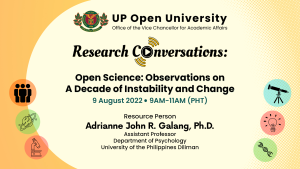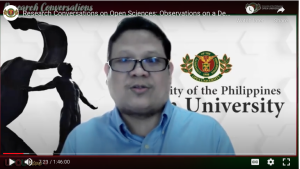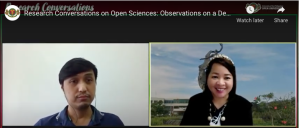
The UP Open University (UPOU) conducted its first webinar installment for the Research Conversations Series on Open Science on 9 August 2022. Dr. Adrianne John R. Galang, Assistant Professor at the Department of Psychology in UP Diliman, served as the resource person. Dr. Galang works in quantitative psychology, with expertise in psychometrics and behavioral experiment design. Dr. Galang talked about “Open Science: Observations on a Decade of Instability and Change.”

Dr. Primo G. Garcia, Vice Chancellor for Academic Affairs, stated in his welcome remarks that this series is part of the University’s thrust of pursuing more open and impactful research. Dr. Myra Oruga, Assistant Vice Chancellor for Research, moderated the session.
In his presentation, Dr. Galang said that the current emphasis on volume of publications is affecting the quality of scientific research. He said that the open science movement seeks to address such problems by promoting the value of transparency in the research process, particularly through data sharing, preregistration of research plans and registration of the research process.

During the open forum, it was mentioned that there are ethical issues surrounding the lack of transparency in blind reviews of academic publications, advising of research students, and how scientific findings and claims are reported or publicized. He also highlighted the challenges of ensuring the privacy of the participants for the purpose of data sharing and the need for a review system for sharing large and small sample data. Dr. Galang also cited that it is difficult to address these challenges since most universities currently implement a research incentive system that focuses more on the quantity rather than the quality of publications.
The legal issues surrounding ownership of scientific data and results should also be considered. He said that the University of the Philippines, which is a publicly funded institution, could explore open patents.
When asked about the rigor of available or shared data for student’s research, Dr. Galang said that he sees no problem in it since it still requires intellectual work to think about good research questions and identify what available data should be used.
Dr. Galang further stated that open science should help us determine which scientific findings can be relied on or not. While open science connotes unboundedness, it can also mean setting the parameters, limits and boundaries that will allow us to discriminate between good and bad science. He said that while there are no universal standards for open science, there are platforms (like Open Science Framework, Transparency and Openness Promotion ) where one could register research reports and learn more about open science metrics. As a community, open science is still in the development stage, hence the current proliferation of standards.
He said that the scientific community should provide space and recognition not only to researchers who do ground breaking work but also those who are doing carefully done, firm, and transparent research. We should be questioning science if it only reports “successful” findings and is silent on “unsuccessful” results.
There is also a concern about the proliferation of open access publications deemed as predatory. He said that predatory journals tend to be less concerned with quality and rigor of the review process but more on putting out as many publications as possible while requiring disproportionately high publication fees. Unfortunately, the current university reward system does not encourage publication in quality open access journals.
He added that open science requires a movement that will support and value researchers who do open science. He believes that the public should be able to trust science and the only way to do that is for researchers to make themselves trustworthy and more transparent to each other.
The webinar was organized by the Office of the Vice Chancellor for Academic Affairs (OVCAA), in collaboration with the UPOU Research and Publication Committee.
It was live streamed over UPOU Networks, UPOU YouTube, and UPOU Networks Facebook page.
Contributed by the Office of the Vice Chancellor for Academic Affairs







